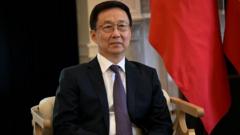Amidst rising global tensions, China has opted to send Vice-President Han Zheng to witness the inauguration of U.S. President-elect Donald Trump, breaking from tradition where foreign leaders typically do not attend. This milestone is not only historic, as it is the first time a senior Chinese leader is attending such an event, but it also implies a potential thaw or strategic recalibration in U.S.-China relations.
China Sends Vice-President Han Zheng to Trump's Inauguration

China Sends Vice-President Han Zheng to Trump's Inauguration
China's decision to send VP Han Zheng for the U.S. presidential inauguration marks a significant diplomatic gesture amidst rising tensions.
Han's presence is intended to symbolize China’s hope for constructive engagement with the incoming Trump administration. Officials in Beijing are keen to address their numerous concerns regarding Trump's anticipated policies, which may include tariffs on Chinese imports. In light of this, Han’s role as a potential negotiator is seen as a strategic move considering his experience in foreign affairs and his previous leadership in initiatives like the Belt and Road.
The selection of Han has led to speculation; previously, advisors indicated a preference for sending higher-ranking officials, like Xi's trusted aide Cai Qi. However, sources suggest that by sending Han, Xi Jinping wants to maintain a degree of distance from what could be a controversial political engagement. Analysts note that while Han's seniority aligns with diplomatic norms, it also serves as a cautious approach should U.S.-China relations deteriorate.
The invitation list for the inauguration also includes several other international leaders, demonstrating Trump's intent on fostering dialogue with both allies and rivals. This strategic diplomatic endeavor illustrates Trump's broader approach to foreign policy, where personal relationships can yield significant political outcomes.
While the future of U.S.-China relations remains uncertain, Han's attendance at Trump's inauguration could set the stage for future negotiations and possible collaboration, reflecting the complexities of diplomatic ties in a rapidly changing geopolitical landscape.
Ultimately, Han Zheng's role could consist of walking a fine line— a blend of engagement while also ensuring that China is not perceived as a subordinate in the unfolding U.S. political drama. With the stakes as high as they are, both nations are keeping a close watch on the implications this event may have for their intertwined futures.
The selection of Han has led to speculation; previously, advisors indicated a preference for sending higher-ranking officials, like Xi's trusted aide Cai Qi. However, sources suggest that by sending Han, Xi Jinping wants to maintain a degree of distance from what could be a controversial political engagement. Analysts note that while Han's seniority aligns with diplomatic norms, it also serves as a cautious approach should U.S.-China relations deteriorate.
The invitation list for the inauguration also includes several other international leaders, demonstrating Trump's intent on fostering dialogue with both allies and rivals. This strategic diplomatic endeavor illustrates Trump's broader approach to foreign policy, where personal relationships can yield significant political outcomes.
While the future of U.S.-China relations remains uncertain, Han's attendance at Trump's inauguration could set the stage for future negotiations and possible collaboration, reflecting the complexities of diplomatic ties in a rapidly changing geopolitical landscape.
Ultimately, Han Zheng's role could consist of walking a fine line— a blend of engagement while also ensuring that China is not perceived as a subordinate in the unfolding U.S. political drama. With the stakes as high as they are, both nations are keeping a close watch on the implications this event may have for their intertwined futures.






















